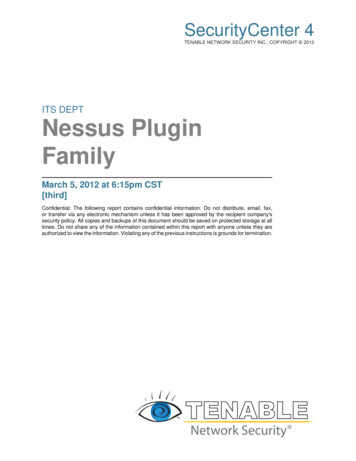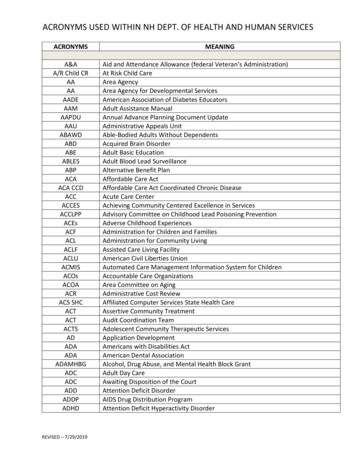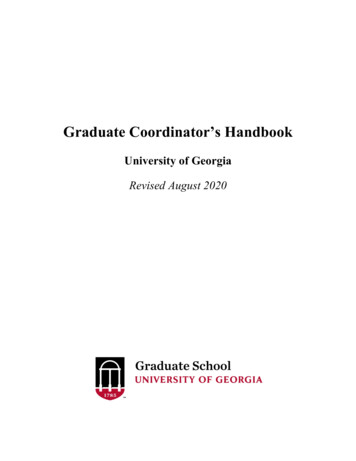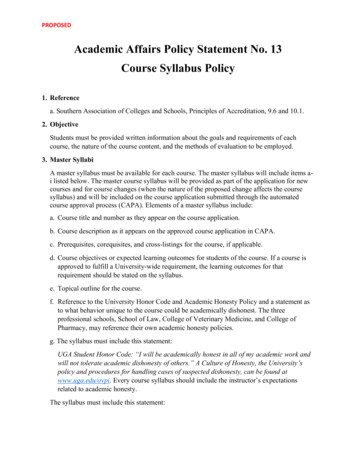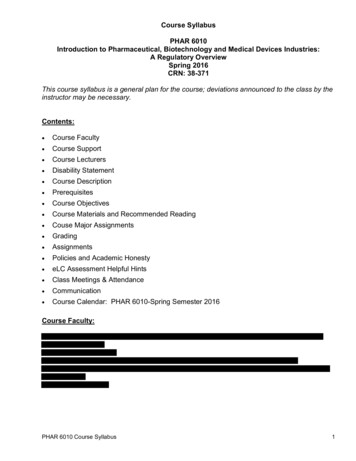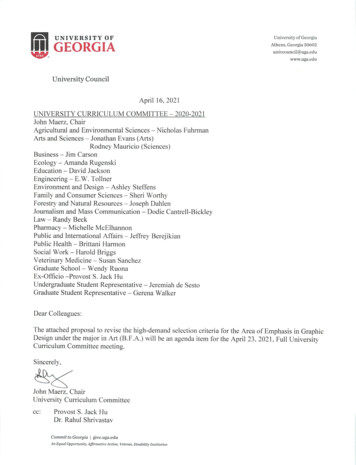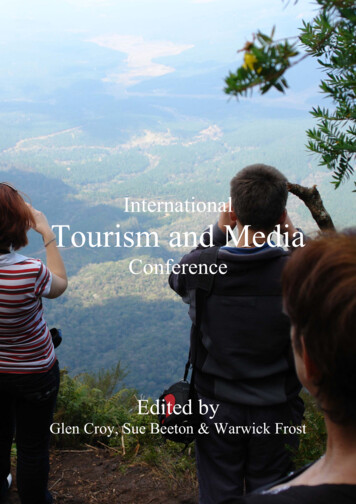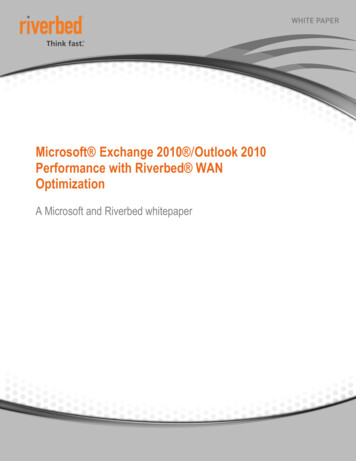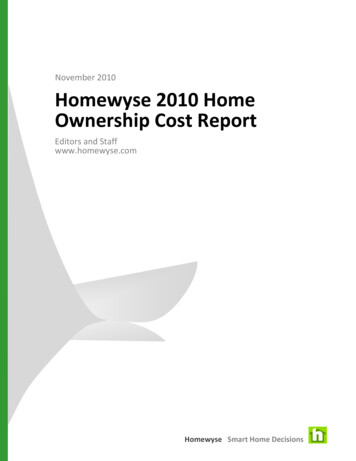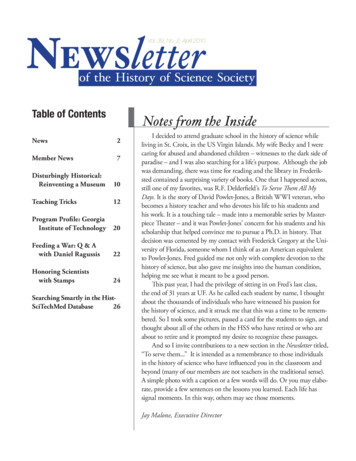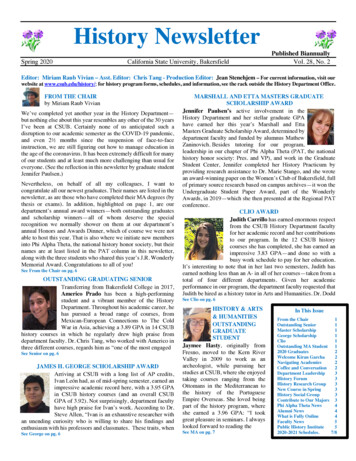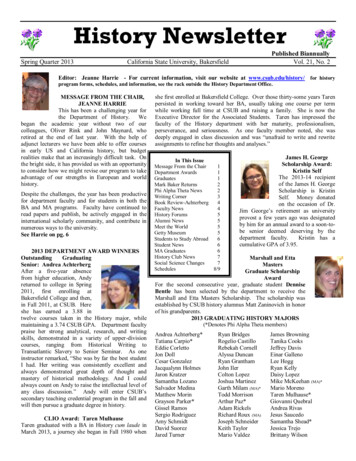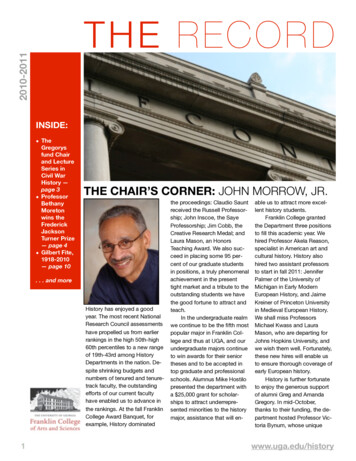
Transcription
2010-2011THE RE C O RDINSIDE: TheGregorysfund Chairand LectureSeries inCivil WarHistory —page 3 ProfessorBethanyMoretonwins theFrederickJacksonTurner Prize— page 4 Gilbert Fite,1918-2010— page 10THE CHAIR’S CORNER: JOHN MORROW, JR. . . and moreHistory has enjoyed a goodyear. The most recent NationalResearch Council assessmentshave propelled us from earlierrankings in the high 50th-high60th percentiles to a new rangeof 19th-43rd among HistoryDepartments in the nation. Despite shrinking budgets andnumbers of tenured and tenuretrack faculty, the outstandingefforts of our current facultyhave enabled us to advance inthe rankings. At the fall FranklinCollege Award Banquet, forexample, History dominated1the proceedings: Claudio Sauntreceived the Russell Professorship; John Inscoe, the SayeProfessorship; Jim Cobb, theCreative Research Medal; andLaura Mason, an HonorsTeaching Award. We also succeed in placing some 95 percent of our graduate studentsin positions, a truly phenomenalachievement in the presenttight market and a tribute to theoutstanding students we havethe good fortune to attract andteach.In the undergraduate realmwe continue to be the fifth mostpopular major in Franklin College and thus at UGA, and ourundergraduate majors continueto win awards for their seniortheses and to be accepted intop graduate and professionalschools. Alumnus Mike Hostilopresented the department witha 25,000 grant for scholarships to attract underrepresented minorities to the historymajor, assistance that will en-able us to attract more excellent history students.Franklin College grantedthe Department three positionsto fill this academic year. Wehired Professor Akela Reason,specialist in American art andcultural history. History alsohired two assistant professorsto start in fall 2011: JenniferPalmer of the University ofMichigan in Early ModernEuropean History, and JaimeKreiner of Princeton Universityin Medieval European History.We shall miss ProfessorsMichael Kwass and LauraMason, who are departing forJohns Hopkins University, andwe wish them well. Fortunately,these new hires will enable usto ensure thorough coverage ofearly European history.History is further fortunateto enjoy the generous supportof alumni Greg and AmandaGregory. In mid-October,thanks to their funding, the department hosted Professor Victoria Bynum, whose uniquewww.uga.edu/history
THE RECORD 2010-2011MIKE HOSTILO:FUNDING DIVERSITYMike Hostilo is a personal injury lawyer based in Savannah, Georgia. Butin the 1980s he was a history major atthe University of Georgia. After finishing at UGA and Atlanta Law School,he returned to the Savannah area topractice law in 1992. Recently, Mikegave 25,000 to establish a scholarship fund to support underrepresented minority undergraduates whochoose to major in history at UGA.Here, he reflects on his career as ahistory major.Why did you choose to studyhistory at UGA?I love the subject area of history,and I am quite fascinated by the pastand our ancestors.How did it prepare you for whatyou've done since leaving UGA?Being a history major allowed meto be able to handle the voluminousreading material requirements in lawschool, and as a practicing attorneytoday, I am still able to read andunderstand volumes of material atlength.What are some of your favoritememories from life as a historystudent?I thoroughly enjoyed Dr. Thomas's southern history class and Dr.Ganshow’s Chinese history lectures.THE CHAIR’S CORNER,CONTINUEDperspective on the Civil War era is evident in her three outstanding books.Professor Bynum visited undergraduate and graduate classes, and presented a Wednesday evening talk thatfilled the University Chapel with ourundergraduate students, duly impressing the Gregorys, Franklin CollegeDean Garnett Stokes, and us. We finished the week by hosting the secondannual Uncivil Wars graduate student2Left to Right: Dean Garnett Stokes, Ms. Angie Lane, Michael G.Hostilo, his mother Yoko Hostilo, father Robert Hostilo, and ChairJohn Morrow, at the 2010 Arkansas v. Georgia football game. Asanyone who recalls the 2010 season knows, the company wasmuch better than the football.What advice would you give toprospective history majors?The University of Georgia HistoryDepartment provides a wonderfuleducation. Prospective students canlearn from the mistakes of the past.One of my favorite history quotes byRobert Heinlein says "A generationwhich ignores history has no past andno future." I stuck by this motto during my studies at the university andprospective history majors should aswell in order for history education tocontinually thrive.What led you to fund thescholarship?In the past, I have typically donated to the Athletic Department.Since the History Department springboarded my career path, I felt it was agreat contribution to give back tosuch an influential department.symposium on war and society thatdrew participants from as far away asAustralia. Indefatigable ProfessorSteve Berry and his graduate studentcommittee did a brilliant job of organizing and hosting the weeklong events,with the help of local friends Peggyand Denis Galis and Sam Thomas ofthe T.R.R. Cobb House, and the support of the Dean’s and College Development Offices.To cap this year, history just received permission to fill the GregoryChair in Civil War Era History, whichthe Gregorys have funded with amillion-dollar endowment. Concludingon this high note, I wish to thank all ofyou who have supported us throughthe years with your gifts. We appreciate each and every one of them.John Morrow joined the HistoryDepartment in 1988 as the FranklinProfessor of History, and has served asa department chair three separatetimes. He is the author, most recently,of The Great War: An Imperial History(2004).www.uga.edu/history
THE RECORD 2010-2011The Gregorys with the 2009 recipients of Gregory Research Fellowships. Back, from left: Laura Davis, Angela Elder, FranklinSammons, Leah Richier, Kevin Young, Sean Vanatta, Timothy Johnson, Katherine Rohrer, Kyle Osborne, Keri Leigh Merritt. Front:Stephen Berry, Linda Bachman, Dean Garnett Stokes, Amanda Gregory, Greg Gregory, Victoria Bynum, Gregg AndrewsAMANDA AND GREGGREGORY: A PASSIONFOR THE CIVIL WARERAAs the nation prepares to mark the150th anniversary of the deadliest warin its history, a gift from Amanda andHenry D. “Greg” Gregory Jr. of Atlantais expanding Civil War era studies atthe University of Georgia for facultyand students alike.The Gregorys have given a 1 million gift to establish the Amanda andGreg Gregory Chair in the Civil War Erain the UGA Department of History, partof the Franklin College of Arts and Sciences. An additional 50,000 from theGregorys will support research in CivilWar era studies for graduate studentsand faculty members, while another 10,000 gift will bring a prominenthistorian to UGA this fall to conductspecial seminars with students and todeliver a public lecture.“Private support is crucial toadvancing the important work ofpublic higher education,” said UGAPresident Michael F. Adams. “TheGregorys have combined theirpassion for Civil War studies with agenerous and significant financialcommitment to advance that work inthe History Department at UGA, andwe are deeply grateful to them.”Robert Pratt, former head of the3History Department at UGA, notes thatthe gift from the Gregorys comes at atime when scholars are examining theCivil War from new perspectives. Whileprevious generations of historians havefocused on the military aspects of thewar and on towering figures such asAbraham Lincoln, Robert E. Lee andUlysses S. Grant, scholars today areexploring the social ramifications of thewar, including how it impacted thehome front, the status of women andrace relations.Pratt said that faculty memberssuch as Emeritus Professor EmoryThomas have helped make UGA one ofthe nation’s most attractive institutionsfor students of the Civil War era. Recent hires such as Associate ProfessorStephen Berry continue to attractpromising students, and the gift fromthe Gregorys will have what Prattcalled “a far-reaching impact, both inthe short term and long term.”“We are very grateful to theGregorys for recognizing andsupporting the scholarship of thefaculty and students in our HistoryDepartment,” said Garnett Stokes,dean of the Franklin College. “They arewonderful partners in our mission, andtheir gifts take an already strongdepartment to a new level of nationalprominence.”VICTORIA BYNUM:INAUGURAL GREGORYLECTURERVictoria Bynum and her husband,historian Gregg Andrews, talk withgraduate student Leah Richier atthe reception following the inaugural Gregory Lecture.Victoria Bynum joined us as our firstGregory Guest Lecturer, discussingher newest book, The Long Shadowof the Civil War: Southern Dissent andIts Legacies (UNC Press, 2010). Reiterating the book’s contention that it isimportant to remember the southerners who dissented, Dr. Bynum gave alecture entitled, "Southern Dissentand Outrage: Community, Race andKinship in the Civil War Era," to apacked Chapel audience. She blogsat renegadesouth.wordpress.comwww.uga.edu/history
THE RECORD 2010-2011BETHANY MORETON:WINNER OF THE 2010FREDERICK JACKSONTURNER PRIZEBethany Moreton (Ph.D. Yale,2006) is an Assistant Professor of History and Women's Studies and, for the2010-2011 academic year, a VisitingAssistant Professor of Women's Studies and the History of Christianity atHarvard Divinity School. Her book, ToServe God and Wal-Mart: The Makingof Christian Free Enterprise (HarvardUP, 2009) won the Frederick JacksonTurner Award from the Organization ofAmerican Historians in 2010, and sheis donating all proceeds from the bookto Interfaith Worker Justice and itsaffiliate, the Economic Justice Coalition of Athens. Her other publicationsinclude “The Soul of Neoliberalism,”Social Text 25.3 (Fall 2007) and "MakePayroll, Not War: Business Culture asYouth Culture,” in Bruce Schulman andJulian Zelizer, eds., Rightward Bound:Making America Conservative in the1970s (Harvard 2008). She is currentlyat work on a new book on the religiousdimensions of the Cold War. She wrotethese reflections for the the HistoryNews Network (www.hnn.us) in 2009.My first act of research for ToServe God and Wal-Mart was shoveling fossilized chicken droppings out ofa defunct coop on a goat farm inNorthwest Arkansas. The farm's owners, friends of my favorite agrarian JimScott, evidently took my willingness topick up a shovel as a character reference, and lost no time making me feelat home in Wal-Mart's backyard. Sincewe have no Freedom of InformationAct for the state-supported institutionswe somewhat inaccurately call privatecorporations, the research could onlygo so far by relying on formal archives.It was only through the generosity ofmy hosts in the Ozarks-the originalWal-Mart Country—that I was able tolearn to explore how "Wal-Martism"might fill the conceptual hole in themiddle of "post-Fordism." If the Detroitauto industry had set the pattern forthe first half of the twentieth century—in spatial organization, labor arrangements, finance, family formation,4"Professor Moretoncombines a cool eye ofa journalist, thesympathetic ear of ananthropologist andcritical intelligence of ascholar."Daniel Herwitz, Director,Institute for theHumanities, Universityof Michiganideology, immigration, art—then surelyits successor was a likely site for understanding major developments of thepost-war years.When Wal-Mart beat out ExxonMobil to become the world's largestcompany in 2002, what we knew aboutthe first service company to make it tothe top of the Fortune 400 was whatastute business journalists like BobOrtega had been telling us since theearly 1990s: Wal-Mart had remade retail by achieving such market dominance that it could dictate its terms tothe suppliers rather than the other wayaround. At the fringes of this narrativewere the voices of historic preservationists and organized labor, finallyroused by the Arkansas company'sdisruptive penetration of Vermont, Chicago, and southern California. Thereigning questions about the new topmultinational were often variations on"Wow—how did Wal-Mart do it?" or "IsWal-Mart good for America?"While my 2002 dissertation prospectus referenced this literature,though, it also included chapter proposals that ultimately allowed me toexplore a question I found much moreinteresting, the one that Thomas Frankrevived from the original Populist mobilization: "What's the matter withKansas?"—understood now as "Whyhave Americans on the losing end ofthe deregulated, off-shored serviceeconomy enabled it politically for morethan a generation?" To Serve God andWal-Mart is therefore not so much abook about Wal-Mart as an account ofthe anointing of free enterprise, theunlikely legitimation of neoliberal economics through evangelical religion. Ittells this story through the twinned biographies of the world's largest company and the ideological apparatus itnurtured. It argues that this specificexperience of mass service work transformed economic common sense andinfused it with evangelical values atprecisely the moment that federal redistribution catapulted the Sun Belt toits position of decisive influence withinthe nation. That moment of waxingpower for the old agricultural peripherycoincided with American-led economicintegration, so that the ethos of Christian free enterprise—the odd pairing ofJerry Falwell and Milton Friedman, soto speak—gave late twentieth-centuryglobalization some of its most distinctive characteristics. Ultimately I joinwriters like Janet Jakobsen, Ann Pellegrini, Lisa Duggan, Tanya Erzen, andLinda Kintz in arguing that the Left'sfrustration with the "culture wars" misreads the necessary connection between conservative sexual mores andthe post-1973 economy that Wal-Martultimately dominated.That I got to learn about this complex relationship while living in theOzarks, knee-deep in chicken droppings, was my good fortune.www.uga.edu/history
THE RECORD 2010-20115CLAUDIO SAUNT:RUSSELL PROFESSORIN AMERICAN HISTORY“ I’m tremendously honored to hold this professorship. It allows me toembark on several research projects that I’velong considered buthaven’t had the resources to pursue.”By Phillip Lee WilliamsClaudio Saunt has been namedthe Richard B. Russell Professor inAmerican History at the University ofGeorgia. An accomplished scholarand teacher, Saunt is the awardwinning author of two books with athird now in progress.“Claudio Saunt is a scholar andteacher who has already brought insight and accomplishment to theFranklin College and UGA,” saidGarnett S. Stokes, dean of the Franklin College of Arts and Sciences. “Thishighly coveted professorship is recognition of his work in the past andyet to come. We are delighted.”The Russell Foundation has endowed the Richard B. Russell Professorship in American History at the University of Georgia since 1976. The professorship, named for Georgia’s lateU.S. senator, has been held by distinguished historians who have garnerednational recognition for their research,teaching and writing. Colleagues,friends and admirers of Russell inGeorgia established the Richard B.Russell Foundation, Inc., a non-profitcorporation, to perpetuate the senator’s memory, preserve his records andsupport activities that exemplify hisideals.“It’s wonderful that the RussellFoundation has made one of itspriorities to support Georgia’s publicuniversities. It does so in a number ofways, including funding the RussellProfessorship in American History. I’mtremendously honored to hold thisprofessorship. It gives me the ability toembark on several research projectsthat I’ve long considered but haven’thad the resources to pursue,” saidSaunt.The first Russell Professor, GilbertFite, was the author of a definitivebook on Russell’s life, Richard B. Russell, Jr., Senator from Georgia (University of North Carolina Press, 1991).Other professors to hold this chair include Pulitzer Prize-winning authorsWilliam McFeely and Edward Larson.Claudio Saunt, Richard B.Russell Professor inAmerican HistorySaunt earned his bachelor’sdegree in history from ColumbiaUniversity in 1989, and his master’sand doctoral degrees from DukeUniversity in 1991 and 1996respectively. In addition to hisappointment in the Department ofHistory, he is associate director of theInstitute of Native American Studies atUGA. His most recent book is Black,White, and Indian: Race and theUnmaking of an American Family(Oxford University Press, 2005). He haspublished articles in the Journal ofAmerican History, the William and MaryQuarterly, the Journal of SouthernHistory, the American Indian Quarterlyand many others.He was awarded a year-long research fellowship by the AmericanPhilosophical Society in 2009 and wonthe Bolton-Cutter Award from theWestern History Association for theBest Article on Borderlands History,also in 2009. In addition, Saunt is winner of the 2005 Clements Prize fromthe Clements Center for SouthwestStudies at Southern Methodist University for the best non-fiction book onSouthwestern America, and the Greenand Ramsdell Award from the Southern Historical Association for the bestarticle published in the Journal ofSouthern History during 2004 and2005. He also is a winner of theWheeler-Voegelin Award from theAmerican Society for Ethnohistory forthe best book in ethnohistory (2000)and the Charles S. Sydnor Award fromthe Southern Historical Association forthe best book on Southern history(2000).Saunt has taught American Indianhistory at UGA, as well as a class onearly America and seminars in American history and early American history.Saunt is currently completing a bookentitled "America in 1776." In that year,the British chased the ContinentalArmy south across New Jersey. Washington's troops barely escaped on several occasions and then scored a stunning victory at Trenton on ChristmasEve. That story has been told numerous times. Saunt's book is about therest of the continent. It explores eightAmerican communities in the year ofour nation's founding, including Unalaska Island, San Diego, the BlackHills, and eastern Saskatchewan. In ayear usually spent confined to the EastCoast, "America in 1776" invites thereader to explore the wider continent.Saunt is also working on severalGIS (geographic information systems)projects. Collaborating with NASA researcher Sergio Bernardes, Saunt hasvectorized maps that plot the colonialpopulation in the eighteenth century.(Vectorizing is the process of turningimages into equations, so that computers can manipulate them.) He isnow adding the indigenous populationto those maps. “For the first time,”Saunt says, “we will have a picture ofhow populations changed and shiftedin eighteenth-century North America.”www.uga.edu/history
THE RECORD 2010-2011“I am very honored tohold a chair named forDr. Saye, who madesuch a significant markon the study of Georgiahistory and politicsduring his long,distinguished careerhere at UGA.”John InscoeJOHN INSCOE: ALBERT B. SAYE PROFESSOR OF HISTORYBy Phillip Lee WilliamsJohn Inscoe, a faculty membernoted for his work in Southern history at the University of Georgiasince 1984, has been named AlbertB. Saye Professor of History. Hesucceeds David Roberts, who retired, as holder of the chair namedfor one of UGA’s most distinguishedprofessors.“I am very honored to hold achair named for Dr. Saye, who madesuch a significant mark on the studyof Georgia history and politics during his long, distinguished careerhere at UGA,” said Inscoe.Albert Saye began his career atUGA in 1939 when he was appointed an instructor in history. Hewas later named an assistant professor of political science and became Alumni Foundation Distinguished Professor and then RichardB. Russell Professor of Political Science. He was widely known as aleading authority on state and federal constitutional law and was theauthor of numerous books and articles.Saye died in 1989. According tothe New Georgia Encyclopedia, “He6was the author of 12 books, six ofwhich focused on Georgia history.New Viewpoin
MIKE HOSTILO: FUNDING DIVERSITY Mike Hostilo is a personal injury law-yer based in Savannah, Georgia. But in the 1980s he was a history major at the University of Georgia. After finish-ing at UGA and Atlanta Law School, he returned to the Savannah area to practice law in 1992. Recently, Mike gave 25,000 to establish a scholar-
